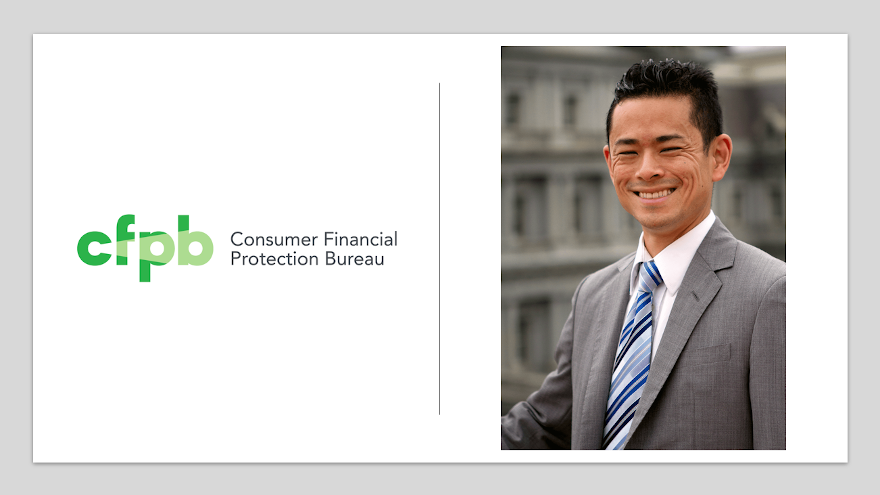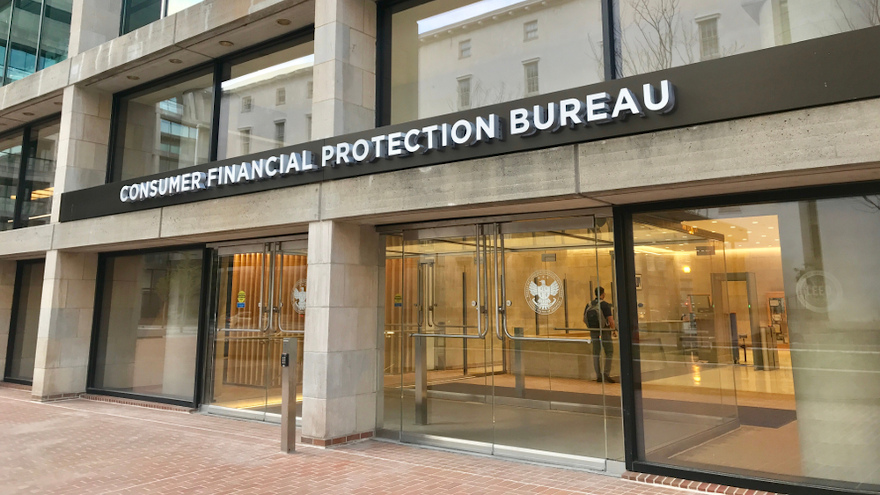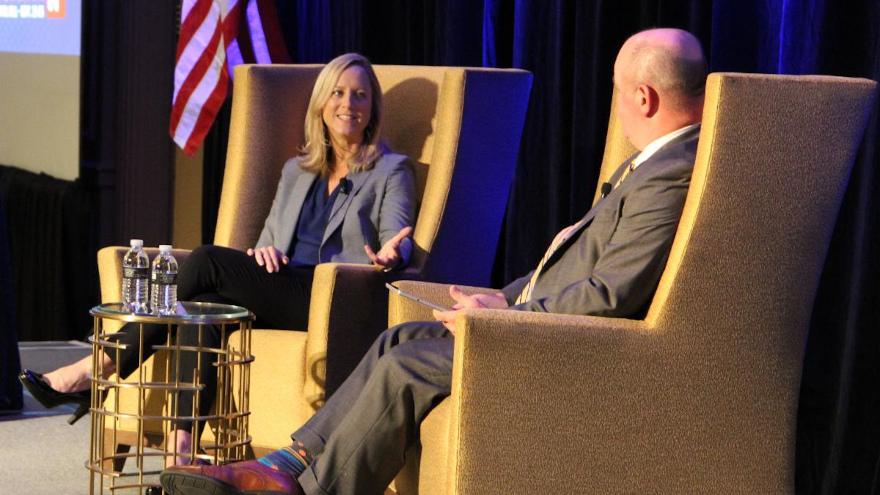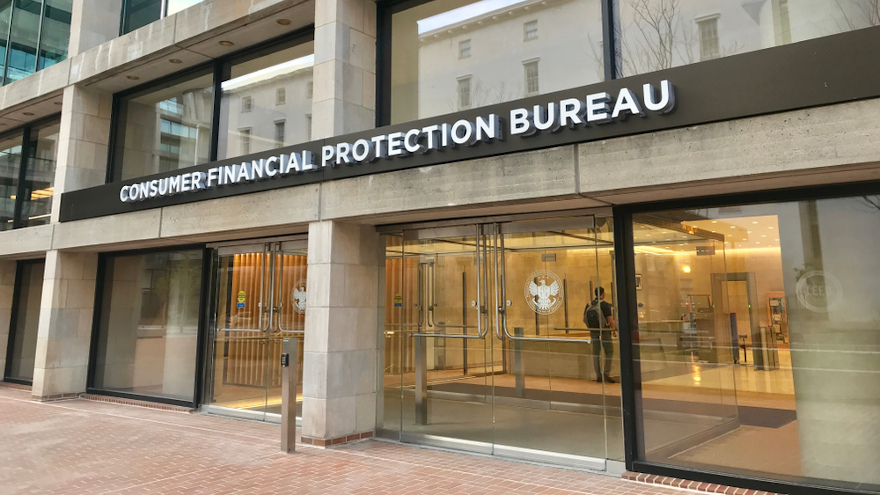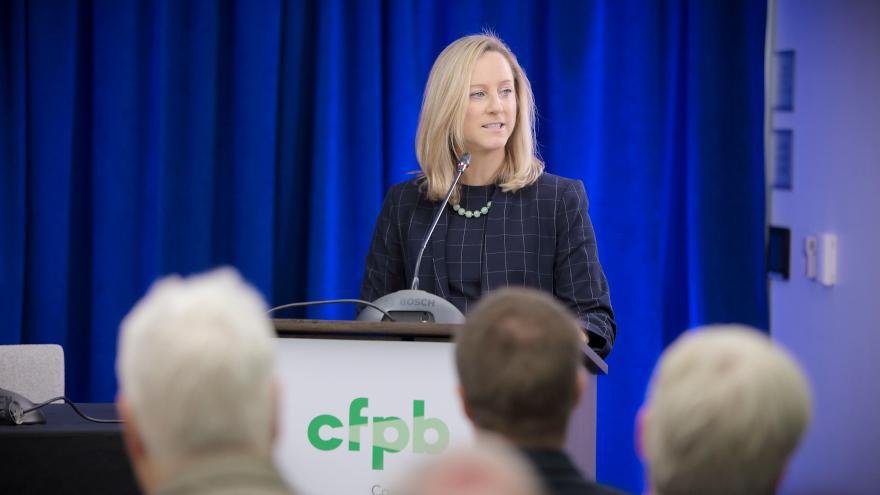On Jan. 18, President Biden revealed his nominations to lead the Consumer Financial Protection Bureau and the Securities and Exchange Commission.
On Tuesday, the Senate Banking Committee will hold a hearing to interview Rohit Chopra, currently a commissioner with the Federal Trade Commission who has been picked to oversee the CFPB, and Gary Gensler, who previously served as chairman of the U.S. Commodity Futures Trading Commission and has been selected to run the SEC.
Sen. Sherrod Brown, an Ohio Democrat and chair of the committee, met with Chopra earlier this month and shared this synopsis of the gathering through a news release.
“Rohit Chopra is the kind of bold and experienced person we need to serve as the next director of the Consumer Financial Protection Bureau,” Brown said. “During our meeting, we discussed his plans to rebuild the CFPB after the Trump administration weakened the agency, as well the agency’s plans to protect consumers — and in particular homeowners — during and after the pandemic.
“We also discussed the importance of the CFPB’s role in rooting out illegal discrimination and ensuring a fair and equitable market for consumer financial products and services,” Brown continued. “I am confident in Mr. Chopra’s ability to lead the agency and look forward to what we can accomplish together to address racial inequities and help American families during this pandemic.”
Meanwhile, Senate Banking Committee ranking member Sen. Pat Toomey, a Pennsylvania Republican, and Rep. Patrick McHenry, a North Carolina Republican and the U.S. House Financial Services Committee ranking member, delivered a letter earlier this month to the acting SEC director urging Allison Herren Lee “to start or complete seven good government initiatives, several of which have been awaiting action for years.”
Toomey and McHenry also wrote, “We hope that you will be a steady and effective caretaker of the SEC’s tripartite mission of protecting investors, maintaining fair, orderly, and efficient markets, and facilitating capital formation. In the spirit of President Biden’s inaugural commitment to unity, we write to highlight some good government initiatives that the SEC should immediately undertake to advance its mission and the interests of investors.”
The entire letter can be found online here.
On Wednesday, Dave Uejio — the acting director of the Consumer Financial Protection Bureau — said he met with staff from the regulator's Division of Consumer Education and External Affairs (CEEA).
Among the findings and directives originating from last week's gathering, Uejio described how the financial services sector has been responding to consumer complaints, which he called the “lifeblood” of the CFPB.
In a blog post on the regulator’s website, Uejio not only recapped the meeting but also shared some unflattering assessments of what providers currently are doing to remedy consumer complaints, especially during the pandemic.
In fact, Uejio said CEEA should “redouble” its efforts moving forward to ensure the bureau engages all consumers who are economically suffering.
“As I said before, a change in strategic direction is not a reflection on the quality of the work performed by bureau staff over the past several years. I know that the dedicated staff in CEEA has consistently championed vulnerable populations and advocated for engaging directly with the people we serve. I eagerly anticipate this agency doing exactly that,” Uejio said.
“One of my top priorities is making sure that consumers who submit complaints to us get the response and the relief they deserve,” he continued. “Consumer complaints are our lifeblood; our direct connection to consumers in distress, and they are at an all-time high right now.
“I understand that some companies have been lax in meeting their obligation to respond to complaints,” Uejio went on to say. “It is the bureau’s expectation that companies provide substantive responses that address the issues consumers describe in their complaints.”
Uejio mentioned another part of addressing consumer complaints that touched on an element that’s gained more attention recently.
“I also understand that consumer advocates have found disparities in some companies’ responses to Black, Brown, and Indigenous communities. This is unacceptable,” he said.
“I have asked Consumer Response to prepare a report highlighting the companies with a poor track record on these issues. We will be publishing this analysis and the senior leadership of these companies can expect to be hearing from me,” Uejio added.
Along with that report, Uejio gave CEEA marching orders to complete other tasks.
First, Uejio wants the bureau to refresh its website to be more user friendly, “focused on consumers rights and signals that in no uncertain terms, we are on their side.”
He also is looking for the CFPB to expand its social media presence “so that we hear directly from the people we serve,” adding that, “to reach consumers where they are, we must keep up with how people access information regardless of device or form.”
Finally, Uejio is seeking that bureau “aggressively” rebuild and repair relationships with consumer, civil rights, racial justice and tribal and Indigenous rights groups.
“We cannot execute on these bold ideas unless we robustly engage with external stakeholders who support economically vulnerable consumers,” he said.
While he might be serving as director of the Consumer Financial Protection Bureau only in an interim capacity, Dave Uejio doesn’t appear to be just sitting idle as lawmakers eventually consider President Joe Biden’s nominee to be the permanent fixture in the post.
Through a blog post on the CFPB’s website, Uejio articulated his priorities, beginning with reversing policies of the last administration that he said “weakened enforcement and supervision.”
As of Thursday, Uejio said it now is the official policy of the CFPB to supervise lenders with regard to the Military Lending Act.
“And we are planning to rescind public statements conveying a relaxed approach to enforcement of the laws in our care,” he said in the blog post.
Uejio moved on to another topic that’s been top of mind in many conversations by lawmakers, policymakers and advocates in recent months.
“It’s also time for the CFPB to take bold and swift action on racial equity. I know this is close to the hearts of many of you. The country is in the middle of a long overdue conversation about race, and as we all know, practices and policies of the financial services industry have both caused and exacerbated racial inequality,” Uejio said.
“I am going to elevate and expand existing investigations and exams and add new ones to ensure we have a healthy docket intended to address racial equity. This of course means that fair lending enforcement is a top priority and will be emphasized accordingly,” he continued. “But we will also look more broadly, beyond fair lending, to identify and root out unlawful conduct that disproportionately impacts communities of color and other vulnerable populations.”
Uejio ascended into being director for the time being after Biden installed him in the position following a demand for the resignation of Kathleen Kraninger, who immediately left the CFPB on Inauguration Day.
Two days earlier, Biden picked Rohit Chopra, currently a commissioner with the Federal Trade Commission, to oversee the CFPB.
Until Chopra is confirmed by the Senate, it will be Uejio running the CFPB.
“Having joined the bureau in 2011, I have seen firsthand the impact of the bureau’s mission and the incredible work being done by its staff. I know that the bureau’s staff shares my devotion to the bureau’s mission, and I look forward to serving in this latest capacity,” Uejio said.
An hour after President Joe Biden took the oath of office on Wednesday, Kathleen Kraninger resigned as director of the Consumer Financial Protection Bureau.
Kraninger said in a post on Twitter along with her resignation letter: “As requested by the Biden administration, today I resigned as director of the CFPB. I am proud of all that we accomplished on behalf of consumers. It has been an honor to lead the agency during these challenging times.”
In her letter, Kraninger went on to say, “It has been my honor to serve the American people for over 20 years, and my privilege to do so alongside the many career and political civil servants who put country over self. As I testified during my confirmation hearing, throughout my career, I have focused on implementing common-sense solutions to complex problems and delivering real value for the American people.
“Over the past two years, that is precisely what I have done — with the law as my guide, with the support of the dedicated CFPB staff, and in partnership with the many stakeholders who join in the bureau’s mission ‘to ensure all consumers have access to markets for consumer financial products and services … that are fair, transparent and competitive.”
The nearly six-month, politically divided slog to confirm Kraninger as the next director of the CFPB reached a highly partisan finale in December 2018. The Senate with its slight Republican majority at that time voted 50-49 to install Kraninger as CFPB director, replacing acting director Mick Mulvaney, who was put in the position by then-President Donald Trump.
Dan Berger, president and chief executive officer of the National Association of Federally-Insured Credit Unions (NAFCU) issued this statement after Kraninger resigned.
“NAFCU thanks director Kraninger for her leadership at the CFPB and commitment to strengthening the financial services system,” Berger said. “We appreciate her receptiveness to hearing credit unions' perspective during her tenure, taking several of our concerns into consideration in the bureau's regulatory efforts, and support for industry's mission to provide safe, affordable financial products and services to its 123 million members. We will continue to work closely with the bureau as credit unions' voice at the federal level.”
Earlier this week, Biden nominated one of the current commissioners at the Federal Trade Commission, Rohit Chopra, to be the next CFPB director. Kraninger’s resignation might make the leadership change happen faster, but it reinforces a point of caution from Richard Hunt, president and chief executive officer of the Consumer Bankers Association
“CBA commends commissioner Chopra on his nomination to become the CFPB‘s third director. We look forward to hearing his views on implementing fair, long-lasting and balanced consumer protection laws,” Hunt said in a statement.
“The CFPB — as originally envisioned by Congressional leaders and Senator (Elizabeth) Warren — should be an independent agency, free of presidential politics and an advocate for consumers, which requires a consistent, sustainable set of rules allowing all financial institutions to operate on a level playing field in a modern marketplace,” he continued.
“While the Supreme Court ruled the president could replace the bureau’s director ‘at will,’ it did not mandate such, and CBA does not believe it is in the best interest of consumers to have a new director with each change in administration. This whip saw effect will stifle innovation and prevent consistent regulations,” Hunt went on to say.
Hudson Cook partner Lucy Morris collaborated with Chopra when both worked at the CFPB at its inception in 2010. In this commentary posted on the law firm’s website this week, Morris offered this assessment.
“Chopra is a smart, articulate, and strong consumer advocate who will be well received by the bureau’s staff and consumer advocates,” Morris said. “I anticipate that he will be at least as aggressive as former director (Richard) Cordray, if not more, in seeking to expansively use the bureau’s tools, including law enforcement and rulemaking.”
And soon after Kraninger made her resignation public, Mike Litt, the consumer campaign director of U.S. PIRG, the federation of state Public Interest Research Groups, looked ahead to Chopra leading the CFPB.
“With Kathy Kraninger’s departure, the CFPB can immediately return to performing its one job: protecting consumers,” Litt said in a statement. “President Biden’s nominee to direct the bureau, Rohit Chopra, is just the person to right the course, investigate financial wrongdoers and put more money back in the pockets of Americans.”
President-Elect Joe Biden announced a number of key administration posts on Monday, including his choices to lead the Consumer Financial Protection Bureau and the Securities and Exchange Commission.
Biden picked Rohit Chopra, currently a commissioner with the Federal Trade Commission, to oversee the CFPB, and Gary Gensler, who previously served as chairman of the U.S. Commodity Futures Trading Commission, to run the SEC.
“Our administration will hit the ground running to deliver immediate, urgent relief to Americans; confront the overlapping crises of COVID-19, the historic economic downturn, systemic racism and inequality, and the climate crisis; and get this government working for the people it serves,” Biden said in a news release that also mentioned his nominations for deputy secretaries in a wide swath of departments, including interior, agriculture, transportation, education and health and human services.
“These tireless public servants will be a key part of our agenda to build back better, and I am confident they will help make meaningful change and move our country forward,” Biden added.
Bill Himpler, president and chief executive officer of the American Financial Services Association, offered this reaction to Biden’s selection to lead the CFPB.
“AFSA and its member companies congratulate commissioner Chopra on his nomination to lead the Consumer Financial Protection Bureau,” Himpler said in a statement. “Since the bureau’s inception, AFSA and our members in the traditional installment lending, vehicle finance, payment card, and mortgage industries have worked constructively with the CFPB leadership and staff.
“Mr. Chopra understands our issues from his time with both the CFPB and the FTC, and we look forward to working with him and the CFPB staff on policies that ensure consumers are both protected and have access to the credit products that meet their needs,” Himpler continued.
And Dan Berger, president and chief executive officer of the National Association of Federally-Insured Credit Unions (NAFCU), shared this perspective about Chopra.
“NAFCU congratulates FTC Commissioner Rohit Chopra on his expected nomination to serve as CFPB Director,” Berger said in a statement. “NAFCU has enjoyed a strong relationship with bureau leadership over the years, and we look forward to hearing more about commissioner Chopra’s views on regulation and consumer protection during the confirmation process.
“We will continue to advocate for the agency to tailor regulations to reign in bad actors while allowing credit unions to successfully serve their 123 million members,” Berger went on to say.
Chopra previously served as assistant director of the CFPB where he led the agency’s efforts on student loans. In 2011, the Secretary of the Treasury appointed him to serve as the CFPB’s Student Loan Ombudsman, a new position established in the financial reform law. He also served as a special advisor at the U.S. Department of Education.
As mention, Gensler served as chairman of the U.S. Commodity Futures Trading Commission from 2009 to 2014, leading the Obama-Biden administration’s reform of the $400 trillion swaps market. He was senior advisor to Sen. Paul Sarbanes in writing the Sarbanes-Oxley Act and was under secretary of the Treasury for domestic finance from 1999 to 2001 and assistant secretary of the Treasury for financial markets from 1997 to 1999.
Gensler most recently was chairman of the Maryland Financial Consumer Protection Commission from 2017 to 2019 and also worked as chief financial officer for Hillary Clinton’s 2016 presidential campaign.
One of the architects of the CFPB — Sen. Elizabeth Warren — cheered Biden’s nominations for leaders of both federal regulatory agencies.
“For too long, our banking regulators have behaved like they work for the financial institutions they regulate — not the American people. But big change is coming. President-elect Biden couldn't have made two better picks to lead the SEC and CFPB: Gary Gensler and Rohit Chopra,” Warren said on Twitter.
And U.S. PIRG, the federation of state Public Interest Research Groups, applauded the nominations, too, in a statement. Ed Mierzwinski is the organization’s senior director for federal consumer programs, and Mike Litt is its consumer campaign director.
“Rohit Chopra has the ideal background for hitting the ground running at the CFPB,” Litt said. “He helped build the CFPB from the start, served as its first student loan ombudsman and has most recently been a Federal Trade Commissioner. In his government service, he has used all policy levers available to protect consumers from corporate wrongdoers. We couldn’t be happier with his selection to restore the CFPB after three years of disastrous leadership.”
Mierzwinski said: “Gary Gensler possesses the critical skills necessary to fix the SEC, which has engaged in dangerous deregulation that suggests its leadership has forgotten or ignored the lessons of the financial collapse of 2008. He wasn’t afraid to take on Wall Street as chair of the U.S. Commodity Futures Trading Commission and will return the SEC to an agency that both protects small investors from risky practices and protects the financial system from dangerous actors.”
A year-long project commissioned by the Consumer Financial Protection Bureau produced quite a rundown of suggestions for the regulator as well as state and federal lawmakers and agencies on how they could improve.
The CFPB Taskforce on Federal Consumer Financial Law, which includes Hudson Cook partner Jean Noonan, released a two-volume report on Tuesday with approximately 100 recommendations on how to improve consumer protection in the financial marketplace. The bureau highlighted the taskforce report used five interrelated principles that are meant to serve as the foundation for proposed systematic changes to the current legal and regulatory framework, including:
— Consumer protection
— Information and education
— Competition and innovation
— Regulatory modernization and flexibility
— Inclusion and access
In its report, the taskforce made about 100 recommendations to the bureau, Congress, and state and federal regulators to strengthen consumer protection. Among some the taskforce recommendations (listed in no particular order) are:
— Authorize the bureau to issue licenses to non-depository institutions that provide lending, money transmission, and payments services
— Expand access to the payment system by unbanked and underbanked consumers and ensure consistent treatment by applying the same rules to similar financial products
— Identify competitive barriers and make appropriate recommendations to policymakers and regulators for expanding access to the payments systems by non-bank providers
— Research and develop policies tailored to the unique challenges of formerly incarcerated people, and work with state and federal authorities to improve protection of this population
— Research and develop policies to address problems of financial inclusion in rural communities
— Facilitate creditor access to immigrants’ credit information prior to their arrival in the United States in order to use that information in credit decisions
— Research consumer reporting issues that arise in connection with a consumer’s bankruptcy
— Consider the benefits and costs of preempting state law where conflicts can impede the provision of valuable products and services, such as the regulation of fintech companies engaged in money transmission
— Identify opportunities to coordinate regulatory efforts. For example, the bureau and prudential regulators should eliminate overlapping examination subject areas and reconcile inconsistent examination standards that unnecessarily expend multiple resources and can cause confusion
— Continue to increase dialogue with state regulators to bridge knowledge gaps and streamline regulation
— Work with other agencies to create a unified regulatory regime for new and innovative technologies providing services similar to banks
— Establish independent review of the bureau’s regulatory cost-benefit analyses by staffing an office of cost-benefit analysis at the bureau and or by submitting its analyses to Office of Information and Regulatory Affairs for review
— Evaluate any positive or negative effect on inclusion as part of the bureau’s cost-benefit analyses as appropriate;
— Exercise caution (a recommendation for the bureau, Congress and other federal and state regulators) in restricting the use of nonfinancial alternative data, which can be useful indicators of creditworthiness
— Clarify the obligations of credit reporting agencies and furnishers with respect to disputes under the Federal Credit Reporting Act
— Assess periodically the accuracy and completeness of consumer credit reports
Chartered by the bureau last January, the taskforce has examined the existing legal and regulatory environment facing consumers and financial services providers.
The CFPB highlighted the Taskforce was in part inspired by the National Commission on Consumer Finance, which was established by the Consumer Credit Protection Act in 1968 to conduct original research and provide recommendations relating to the regulation of consumer credit.
To help inform its work, the taskforce engaged with external stakeholders, including consumer advocates, the bureau’s combined advisory boards, state and federal regulators, and industry. The taskforce’s report discusses what it learned during its examination and outreach to stakeholders and offers recommendations for the future of consumer financial protection.
“I want to thank Taskforce chair Todd Zywicki and members Dr. Howard Beales, Dr. Thomas Durkin, Jean Noonan, and William MacLeod for applying their considerable expertise and experience in consumer protection to prepare an insightful report that will be incredibly valuable to policymakers,” CFPB director Kathleen Kraninger said in a news release.
“The bureau is already committed to many of the recommended ideas presented in the report. The taskforce recommendations help define and illuminate our current path,” Kraninger continued.
Zywicki added, “On behalf of the Taskforce, I want to thank director Kraninger, deputy director Tom Pahl, and the incredible staff of the CFPB for granting us the opportunity to serve the American consumer in this effort. We were animated by the goal of promoting a strong and vibrant system that will protect consumers from harm and enhance access and choice for all Americans.
“The COVID-19 pandemic highlights the need to provide greater financial regulatory flexibilities and accelerated the adoption of new financial technologies, which raise both new opportunities and new threats for consumers,” he said. “By leveraging our combined 150 years of professional experience of seeking to improve the health of America’s financial system and the unique experiences and expertise inside and outside of the bureau, we have created a document that will help provide guiding principles to advance the cause of consumer protection and inclusion for years to come.”
The first volume of the report can be downloaded here while the second one is available here.
Industry reaction to report
The American Financial Services Association (AFSA) and the Consumer Bankers Association (CBA) generally had positive things to say when the taskforce’s report arrived on Tuesday. AFSA shared this statement with SubPrime Auto Finance News:
The American Financial Services Association is pleased that the Consumer Financial Protection Bureau Taskforce on Federal Consumer Financial Law has issued its report. The members of the taskforce have spent the bulk of their careers studying consumer finance and we encourage policymakers to closely review their important work in this report.
The prime focus of this Taskforce report is the effect of regulation on consumers and their access to credit. The last time such a comprehensive review was undertaken by the federal government was the 1970s. Clearly, much has changed — both for consumers as well as the diverse and evolving consumer credit industry – and our hope is that this report serves as a crucial resource for policymakers and our industry moving forward in shaping pro-consumer policies that expand consumer access to credit.
AFSA thanks director Kraninger for initiating and supporting the work of the Taskforce, as well as the members of the taskforce for their dedicated service. AFSA looks forward to both reviewing the report in detail and highlighting key elements that affect our member companies, as well as the millions of consumers they serve.
Furthermore, Consumer Bankers Association president and chief executive officer Richard Hunt offered this perspective.
“The CFPB, taskforce members and director Kraninger should be commended for undertaking this important initiative. Consumers are best served within the well-regulated banking industry and ensuring the rules of the road are consistent, harmonized and adapted to meet the demands of modern consumers and modern banking practices will help ensure continued and expanded access to credit for all Americans,” Hunt said.
“We look forward to reviewing the report and working with the Bureau on these and future recommendations,” he added.
The National Association of Federally-Insured Credit Unions (NAFCU) president and chief executive officer Dan Berger also weighed in on this week’s report release.
“NAFCU strongly appreciates the CFPB and its Taskforce on Federal Consumer Financial Law listening to our calls for reform and announcing their support for several of our recommendations,” Berger said in a statement from NAFCU.
“In addition to their support for expanding credit union access in underserved areas, we were pleased to see support for our longstanding call to modernize ESIGN Act requirements, expanding the use of alternative data and minimizing examination overlap included in the taskforce’s report,” Berger continued. “We strongly encourage policymakers to move forward with these recommendations and several others that will provide regulatory relief to credit unions — allowing them to better serve their growing membership.”
Consumer-oriented organizations offer assessments, too
Meanwhile, consumer-advocate organizations that sent statements to SubPrime Auto Finance News offered a much different viewpoint about what the taskforce assembled.
One perspective came from U.S. PIRG, the federation of state Public Interest Research Groups. Ed Mierzwinski is the organization’s senior director for federal consumer programs, and Mike Landis serves as its litigation director.
“We’ve already asked the Biden transition team to throw this illegitimate task farce’s report in the dumpster,” Mierzwinski said. “Most of its recommendations follow a dangerous, deregulatory, industry-approved playbook.”
Landis added, “This one-sided, shadowy taskforce is exactly what the Federal Advisory Committee Act was enacted to protect against. We’re confident that the court will see this taskforce for what it is — a blatantly unlawful attempt by the CFPB to favor special interests at the expense of consumers.”
Kathleen Engel is a research professor of law at Suffolk University and has held a number of public service positions, including on the Federal Reserve Board’s consumer advisory council, the CFPB’s consumer advisory board, and vice-chair of the board of Consumer Reports. Engel offered her assessment on behalf of Democracy Forward, a nonprofit legal organization that scrutinizes executive branch activity across policy areas, represents clients in litigation to challenge potential unlawful actions and looks to educate the public when the White House or federal agencies might break the law.
“From day one, director Kraninger and her Taskforce on Federal Consumer Financial Law have flouted federal law. The taskforce fundamentally lacked the credentials to take on a complete review of federal consumer financial laws as it was supposedly tasked to do. Now, in the Trump administration’s waning days, this illegal advisory group is advocating to transform critical consumer protections,” Engel said.
“The taskforce’s report recommends changes to consumer protections that will prove harmful to Americans struggling to weather the economic fallout of the ongoing pandemic,” she continued.
“Developed without transparency or a fairly balanced membership, the report revealed is the fruit of a poisonous tree. The CFPB should make public all records used in preparing the report, should not be permitted to rely on the report’s recommendations in future agency actions, and should label the report the result of an unlawful committee. We’ll continue to fight for these results in court,” Engel went on to say.
It turned out to be an active holiday season at the Consumer Financial Protection Bureau.
Along with naming two new staff members and reaching a consent order with a provider of personal loans, the CFPB also penalized Santander Consumer USA for the second time in three years.
The bureau issued a consent order against Santander to address the regulator’s finding that the finance company violated the Fair Credit Reporting Act (FCRA). Officials explained the consent order was issued in connection with SCUSA providing erroneous consumer loan data to consumer reporting agencies (CRAs).
The CFPB pointed out that Santander furnishes credit information on the auto contract it services by sending monthly data files to CRAs. The bureau said in a news release that it found that the consumer loan data Santander furnished to CRAs between January 2016 and August 2019 contained many systemic errors that, in many instances, could have negatively impacted consumers’ credit scores and access to credit.
The consent order requires Santander to take certain steps to prevent future violations and imposes a $4.75 million civil money penalty.
“The bureau found that Santander furnished consumer loan information to CRAs that it knew or reasonably should have known was inaccurate, including failing to furnish accurate information regarding whether accounts were open or closed and whether consumers were carrying a balance or obligated to make future payments,” the regulator said in that news release.
“The bureau found that Santander failed to promptly update and correct information it furnished to CRAs that it later determined was incomplete and failed to provide the date of first delinquency on certain delinquent or charged-off accounts,” the CFPB continued.
“The bureau further found that Santander failed to establish and implement reasonable written policies and procedures regarding the accuracy and integrity of information provided to CRAs,” the regulator went on to say while also noting that it believes Santander’s conduct violated the FCRA and its implementing regulation, Regulation V, as well as constituted violations of the Consumer Financial Protection Act of 2010.
Under the terms of the consent order, the CFPB indicated Santander must correct all inaccuracies and errors that the bureau identified and take certain steps to improve and ensure the accuracy of the consumer information it provides to CRAs. These steps include conducting monthly reviews of account information to assess the accuracy and integrity of information Santander furnishes.
“Santander must also establish and implement reasonable policies and procedures regarding the accuracy and integrity of information it furnishes to CRAs,” officials added.
SCUSA last faced an enforcement action from the CFPB just before Thanksgiving 2018 in connection with a GAP product.
And in May, Santander finalized a voluntary settlement topping $550 million with 33 states and the District of Columbia that alleged that contracts that the finance company funded through certain dealers dating back to 2010 violated consumer protection laws because of the high risk that certain individuals would default.
Lender involved in MLA violation
In other bureau enforcement activities before 2020 closed, the CFPB issued a consent order against Omni Financial of Nevada. The bureau said it found that Omni violated the Military Lending Act (MLA), Electronic Fund Transfer Act (EFTA), and Consumer Financial Protection Act of 2010 (CFPA) in connection with making installment loans.
Omni, which has its principal place of business in Las Vegas, specializes in lending to consumers affiliated with the military, originating tens of thousands of loans each year with individual loans typically ranging from $500 to $10,000.
The consent order requires that Omni pay a $2.175 million civil money penalty and imposes injunctive relief to stop ongoing violations and prevent future violations.
Officials explained the MLA puts in place protections in connection with extensions of consumer credit for active-duty servicemembers and their dependents who are defined as “covered borrowers.” These protections include prohibiting that loans to covered borrowers be required to be repaid by “allotment.”
The CFPB pointed out the Department of Defense runs the allotment system, which allows servicemembers to designate a portion of their paycheck to certain recipients. The bureau found that since October 2016, Omni’s loans to covered borrowers violated the MLA’s prohibition of requiring repayment by allotment.
The bureau added that it also found that Omni violated EFTA and the CFPA.
In addition to lending to active-duty servicemembers and their dependents, the bureau mentioned that Omni lends to civilians and non-covered servicemembers such as military retirees. The CFPB said it found that Omni requires all of its borrowers to provide bank-account information and authorize Omni to withdraw funds from that account on the first business day after each missed payment.
“Omni’s requirement that consumers allow it to withdraw funds from their bank accounts violates EFTA’s prohibition against requiring consumers to preauthorize electronic fund transfers as a condition of receiving credit,” officials said in a news release. “The bureau further found that these EFTA violations constituted CFPA violations.”
In addition to prohibiting future violations, the consent order requires Omni to provide notice of the bureau’s findings to all customers repaying their loans by allotment along with notice that they may change their repayment method.
Officials added that Omni also must provide training to employees and is prohibited from providing any incentives to employees or performance evaluations that consider the number or rate of consumers who choose to repay by allotment.
New staff members
And just before 2020 closed, the CFPB announced the addition of a deputy chief of staff and an assistant director for the office of innovation.
Ann Epstein will serve as the assistant director of the office of innovation. The CFPB said Epstein was most recently a financial technology consultant advising clients on consumer financial wellness and sustainable housing projects.
Before arriving at the bureau, Epstein worked for 18 years at Freddie Mac.
Jocelyn Sutton will serve as the deputy chief of staff for the bureau. Sutton joined the bureau in 2012. She worked in the office of regulations, before transitioning to the office of the director. Since then, she has served in various capacities, most recently as the bureau’s executive secretariat.
Last Friday, Kathleen Kraninger celebrated her second-year anniversary as director of the Consumer Financial Protection Bureau by highlighting more than 70 accomplishments by the regulator during the past 12 months.
“In these challenging times, I’m proud of the work that the bureau has undertaken to protect consumers during the pandemic,” Kraninger said in a news release that included regulatory developments such as:
— Rapidly responded to the COVID-19 pandemic by producing a series of tools (more than 70 blogs, web pages, and videos) on pandemic-related consumer education materials, many of which are available in multiple languages.
— To date in 2020, the bureau has brought 42 public enforcement actions and is on target to exceed the second-highest number of public enforcement actions filed since the bureau’s inception by the end of this year.
The CFPB’s public enforcement actions have resulted in orders requiring over $1.45 billion in total consumer relief as well as over $270 million in civil money penalties.
— The bureau, the Board of Governors of the Federal Reserve System, the Federal Deposit Insurance Corp., the Office of the Comptroller of the Currency, and the National Credit Union Administration issued a joint statement on the use of alternative data in underwriting by banks, credit unions, and non-bank financial firms.
— Issued debt collection rule to clarify protections under the Fair Debt Collection Practices Act to restate and clarify prohibitions on harassment and abuse, false or misleading representations and unfair practices by debt collectors when collecting consumer debt.
— Fielded more than 500,000 complaints through December compared to 332,000 in the same period in 2019, an overall increase of approximately 51%.
“We have a dedicated workforce that has been focused on carrying out our mission and adapting to the current environment,” Kraninger said. “For example, we have altered the way that we conduct examinations to protect our workforce as they work to protect consumers in the marketplace.
“We will continue to use all of our tools to prevent consumer harm through education, supervision of financial markets, development of regulation and enforcement of the law against bad actors,” she went on to say.
The Consumer Finance Protection Bureau recently entered into a consent order with a national lender regarding certain practices related to vehicle repossession. Since the CFPB appears to generally “regulate by enforcement,” lenders can learn valuable lessons by reviewing the CFPB’s consent orders.
In this case, the CFPB found that lender violated the Consumer Financial Protection Act of 2010 (CFPA) by engaging in a “unfair, deceptive, or abusive act or practice.” The CFPB assessed significant fines and required remediation steps be taken. This article will summarize the consent order.
The first thing learned is that two of the primary violations cited by the CFPB were not actions taken by lender at all, but made on its behalf by third-party service providers. This emphasizes how important it is for lenders to carefully scrutinize the policies and actions of these third-party vendors.
The following four actions were deemed by the CFPB to violate applicable statutes:
1. Wrongfully repossessed vehicles, despite having agreements in place with consumers to prevent repossession.
2. Through repossession agents, kept personal property located in consumers’ vehicles at the time of repossession and would not return that personal property until consumers paid a fee for its storage.
3. Through its service provider, deprived consumers making auto-loan payments by phone of the ability to select a payment option with a significantly lower fee than the one they were charged.
4. Made a deceptive statement in its agreements to extend consumers’ auto loans that appeared to limit consumers’ bankruptcy protections.
The consent order provides details of these violations:
1. Wrongful repossessions.
The lender repossessed vehicles of hundreds of consumers who had:
—Made payments that decreased their delinquency to less than 60 days past due
—Made and kept promises to pay
—Made promises to pay by a future date that had not yet passed
—Agreed to extension agreements
Each of these actions taken by consumers should have prevented repossessions. The CFPB noted that as a result of lender’s wrongful repossessions, consumers lost the use of their vehicles which caused hardships such as missed work, expenses for alternative transportation, repossession-related fees, detrimental credit reporting and vehicle damage in the repossession process.
2. Withholding personal property in repossessed vehicles.
In many cases, consumers’ vehicles contain the consumers’ personal property (e.g. children’s car seats, college textbooks and prescription sunglasses). The lender’s third-party repossession agents in many instances imposed fees on consumers for holding personal property contained in repossessed vehicles. These repossession agents often refused to return consumers’ personal property unless and until the consumers paid the fees. The lender was aware that its repossession agents often refused to return consumers’ personal property until after the consumers paid the up-front fees.
The also represented to some consumers that it had no control over the fees repossession agents charged, but in some instances the lender directed repossession agents to have repossession agents lower the fees charged to consumers. The CFPB found LENDER liable for the actions of its repossession agents.
3. Fees for making payments
The lender permits consumers to make account payments online, telephonically, by mail, or through an auto-debit program. The lender engaged a third-party payment processor to handle consumer calls regarding telephonic payments and to process those payments. This payment processor handled millions of payments for the lender.
The payment processor’s agents spoke to consumers on the lender’s behalf to obtain payments on the lender accounts. The payment processor charged the lender’s consumers $5 for payments by electronic check or in-network debit card payments, but charged more than twice the amount for credit-card and out-of-network debit-card payments. Some of the lender’s consumer-facing materials, such as billing invoices, stated that “transaction fees may apply” for telephonic payments; however, none of their consumer-facing materials disclosed the fee amounts for telephonic payments, or the considerable price difference between available methods of payment by phone.
The lender’s third-party phone-payment processing vendor also failed to tell consumers about significant differences in the fees. As a result, the CFPB found that the actions of the lender, through its third-party service provider, were deceptive and deprived consumers of the ability to choose pay-by-phone options with significantly lower fees.
4. Extension agreement suggests customers cannot file bankruptcy
An agreement to waive an individual’s right to file bankruptcy is void as against public policy. The lender sent extension agreements or written confirmations of oral extension agreements including to numerous consumers which included the following language:
“As a condition of you making this request, you represent that you have not filed and agree that you will not file for bankruptcy protection within 120 days after the date of this correspondence, and that an extension is contingent upon the absence of any such filing. If you should so file for bankruptcy protection, then this agreement is void for misrepresentation, and we may seek payment of the extended payments as originally scheduled and may deem such payment to be in default”.
The CFPB found this language in the lender’s extension agreements created the impression that consumers could not file for bankruptcy. In fact, consumers could file for bankruptcy. The CFPB stated these statements are material because they were likely to affect consumers’ conduct in executing the written extension agreement or considering whether to file for bankruptcy. The CFPB found that the lender’s representations to the contrary were false and misleading.
The consequences: Actions required by the consent order
The CFPB imposed significant multi-million dollar monetary sanctions against the lender. In addition, the consent order requires the lender to do a number of things to remediate these violations by taking the following actions:
• Review its repossession assignment and cancellation process and implement additional system or employee controls and adopt reasonable policies and procedures to avoid wrongful repossessions.
• Review its process for monitoring and addressing system-error messages related to cancelling or holding a repossession and develop and implement any changes necessary to ensure errors are flagged and responded to in a timely manner.
• Track all future wrongful repossessions.
• Conduct a quarterly review of any wrongful repossessions that occur to identify any patterns or practices which need to be addressed.
• Adopt reasonable policies and procedures to remedy instances of future wrongful repossession.
• Provide consumers with remediation for such wrongful repossessions, including waiver or refund of all repossession-related fees, correction of the consumer’s credit report, and a refund of actual costs incurred for both loss of use of the consumer’s vehicle (such as alternate transportation costs) and other reasonable and verifiable consequential damages incurred by the consumer.
• Prohibit its repossession agents (through contract or otherwise) from charging personal property fees to consumers directly and demanding fees as a condition of returning personal property.
• When offering consumers the option to make account payments by phone, the lender (or its third-party service provider) must, on each call during which a consumer makes such a payment, clearly disclose to the consumer the fee for each method of making a payment by phone, before the consumer is asked which method they wish to use. Where the lender charges consumers fees to make payments via other channels (e.g., online portal, postal mail), the lender must disclose all fees for each method on its website or its monthly billing statements.
• Not misrepresent, or assist others in misrepresenting, expressly or impliedly that a consumer may not file for bankruptcy or any other fact material to consumers concerning their rights related to initiating a bankruptcy proceeding.
• Provide reports regarding its compliance with the terms of the consent order
Since its inception, the CFPB has been a powerful and feared regulator. Since the CFPB is an executive agency, it is uncertain who will lead the agency, or how the CFPB will handle rulemaking and enforcement actions in the next administration.
Nevertheless, we strongly recommend auto lenders review and implement policies regarding their payment and repossession procedures to take the findings in this consent order into account. The CFPB will expect lenders to do so.
Dennis LeVine is a partner in the Tampa., Fla., office of Kelley Kronenberg. He can be reached at [email protected].
Along with making five additions to its executive team, this week, the Consumer Financial Protection Bureau issued its final advisory opinions policy. In making the move publicly, the CFPB said it was looking to address regulatory uncertainty in the bureau’s existing regulations and provide guidance to entities on outstanding regulatory uncertainty.
Under the final policy, officials explained entities seeking to comply with regulatory requirements can submit a request to the bureau where uncertainty exists.
“Regulatory certainty promotes compliance if the law applies and avoids unnecessary compliance costs if the law does not,” the CFPB said in a news release.
Under the final policy, officials indicated any person or entity can submit a request for an advisory opinion via email to [email protected]. The bureau said it will review the submissions received, prioritize certain requests for response and issue opinions with a description of the incoming request.
The CFPB noted that it may also decide to issue advisory opinions on its own initiative.
To increase transparency, the bureau said it will publish all advisory opinions in the Federal Register and on this website.
“As explained in the final policy, when selecting requests for consideration, the bureau will prioritize open questions within the bureau’s purview that can legally be addressed through an interpretive rule,” officials said.
The bureau went on to mention that it intends to further evaluate potential topics for advisory opinions based on additional factors, including:
— Alignment with the bureau’s statutory objectives
— Size of the benefit offered to consumers by resolution of the interpretive issue
— Known impact on the actions of other regulators
— Impact on available bureau resources.
A copy of the final advisory opinion program can be found on this website.
Newest CFPB staff members
In other developments from the regulator, the CFPB also announced additions to its executive team. Individuals now in leadership positions include:
— Matthew Bettenhausen will serve as senior advisor and counselor to the director. Bettenhausen has more than 17 years of federal service, principally as an assistant United States attorney with the Department of Justice in the Northern District of Illinois in Chicago. There he served as associate chief of the criminal division and acting chief of appeals, among other supervisory positions, and engaged in many complex financial crime investigations and prosecutions.
— Chris Chilbert now is the chief information officer in the bureau’s operations division. Chilbert has more than 20 years of federal service. Before joining the bureau, he served as assistant inspector general for information technology at the U.S. Department of Health and Human Services’ Office of Inspector General where he led their adoption of modern management practices and technologies.
Chilbert also is a veteran of the U.S. Navy submarine force.
— Janis Pappalardo now is the associate director for research, markets and regulations. Prior to joining the bureau, Pappalardo served as assistant director for consumer protection at the Federal Trade Commission (FTC). In that capacity, she led the only division in the FTC’s bureau of economics devoted to the consumer protection mission.
Pappalardo served at the FTC for more than three decades and started as an economist conducting and initiating independent analyses on consumer protection matters.
— Donna Roy now is the bureau’s chief operating officer. Her management experience of more than 35 years spans working with Fortune 200 Financial Services companies through small, start-up experience as an entrepreneur. Roy served previously as the bureau’s chief information officer.
Before joining the bureau, she served for 13 years in several positions of increasing responsibility at the U.S. Department of Homeland Security, with leadership excellence recognized by both industry and federal government awards. She has more than 20 years of federal government experience as a leader focused on innovative, customer-focused solutions within dynamic environments.
Roy also is a U.S. Marine Corps veteran.
— Deborah Royster now is the assistant director in the office for older Americans. Before joining the bureau, Royster served as chief executive officer of Seabury Resources for Aging, a nonprofit organization that provides affordable housing, transportation, care management and other support services to older adults and family caregivers in the Washington, D.C. region.


